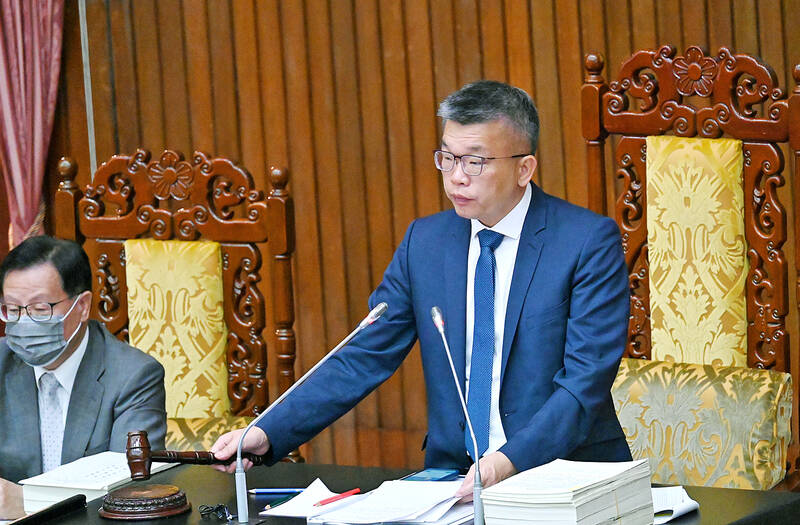Legislators yesterday passed an amendment that would require some newly built, expanded or altered structures to install rooftop solar panels.
The amendment was one of several revisions to the Renewable Energy Development Act (再生能源發展條例) that were approved after being proposed by the Cabinet and sent to the Legislative Yuan in December last year to increase renewable energy sources.
New buildings that meet a size threshold would be required to design and install a specified capacity of solar panels on the building, the amendments say.

Photo: Chu Pei-hsiung, Taipei Time
The building owners would be allowed to use the electricity generated or could sell it to state-run utility Taiwan Power Co or private entities, as stipulated by existing provisions in the act.
The amendments were reviewed along with other proposals by legislators, but the revisions passed were based on the versions proposed by the Cabinet.
The Ministry of the Interior, which oversees the construction industry, and the Ministry of Economic Affairs would finalize the details of the solar panel amendment, such as the size threshold for new buildings and the type of buildings included.
The minimum required solar power installation capacity in the revision would also be finalized, while standards for exposure to the sun and the date the revision is to take effect also need to be decided.
Other areas covered by the amendments were provisions related to offshore wind power, hydropower and geothermal energy sources.
As technological advancements have overcome obstacles such as deep water, the amendment related to offshore wind removes a provision that says offshore wind installations could “not go beyond territorial waters” to expand the range of deployment.
Another revision allows water storage facilities to be used for hydropower generation, and another defined the overseeing authority and application procedures for surveying geothermal power sources.

Taiwan is stepping up plans to create self-sufficient supply chains for combat drones and increase foreign orders from the US to counter China’s numerical superiority, a defense official said on Saturday. Commenting on condition of anonymity, the official said the nation’s armed forces are in agreement with US Admiral Samuel Paparo’s assessment that Taiwan’s military must be prepared to turn the nation’s waters into a “hellscape” for the Chinese People’s Liberation Army (PLA). Paparo, the commander of the US Indo-Pacific Command, reiterated the concept during a Congressional hearing in Washington on Wednesday. He first coined the term in a security conference last

DEFENSE: The National Security Bureau promised to expand communication and intelligence cooperation with global partners and enhance its strategic analytical skills China has not only increased military exercises and “gray zone” tactics against Taiwan this year, but also continues to recruit military personnel for espionage, the National Security Bureau (NSB) said yesterday in a report to the Legislative Yuan. The bureau submitted the report ahead of NSB Director-General Tsai Ming-yen’s (蔡明彥) appearance before the Foreign and National Defense Committee today. Last year, the Chinese People’s Liberation Army (PLA) conducted “Joint Sword-2024A and B” military exercises targeting Taiwan and carried out 40 combat readiness patrols, the bureau said. In addition, Chinese military aircraft entered Taiwan’s airspace 3,070 times last year, up about

A magnitude 4.3 earthquake struck eastern Taiwan's Hualien County at 8:31am today, according to the Central Weather Administration (CWA). The epicenter of the temblor was located in Hualien County, about 70.3 kilometers south southwest of Hualien County Hall, at a depth of 23.2km, according to the administration. There were no immediate reports of damage resulting from the quake. The earthquake's intensity, which gauges the actual effect of a temblor, was highest in Taitung County, where it measured 3 on Taiwan's 7-tier intensity scale. The quake also measured an intensity of 2 in Hualien and Nantou counties, the CWA said.

The Overseas Community Affairs Council (OCAC) yesterday announced a fundraising campaign to support survivors of the magnitude 7.7 earthquake that struck Myanmar on March 28, with two prayer events scheduled in Taipei and Taichung later this week. “While initial rescue operations have concluded [in Myanmar], many survivors are now facing increasingly difficult living conditions,” OCAC Minister Hsu Chia-ching (徐佳青) told a news conference in Taipei. The fundraising campaign, which runs through May 31, is focused on supporting the reconstruction of damaged overseas compatriot schools, assisting students from Myanmar in Taiwan, and providing essential items, such as drinking water, food and medical supplies,